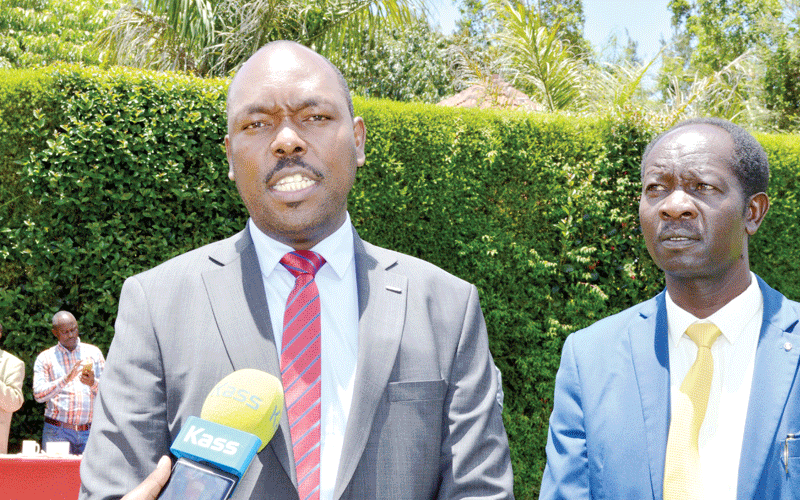Private schools on the verge of closure over Corona crisis
By Bernard Gitau, July 14, 2020A total of 114 private schools are on the brink of closure due to the financial crisis due to suspension over Covid-19 outbreak, Kenya Private Schools Association (KPSA) has said.
Speaking to the People Daily, KPSA Chief Executive Officer Peter Ndoro, he said the sector couldn’t withstand harsh economic times with bills accumulating without a source of funds.
“We have approximately 114 private schools that have the intention of closing down as they cannot hold any more. This will affect over 39,000 learners,” said Ndoro.
He said unless the government comes to the sector rescue, public schools would be overwhelmed when schools finally reopen next year due to high numbers.
To avert the crisis in the education sector, Ndoro said they have requested for a government Credit Guarantee amounting to Sh 7 billion.
“The government should extend a stimulus programme to the private schools to cushion over 300,000 teaching staff and non teaching staff members,” he added.
On the directive by Education CS George Magoha for schools to either refund or push forward the fees paid upfront to parents, Ndoro said they will adhere to it fully.
“Schools that will be operational will push ahead the fees to next term but those that will close, the management should refund school fees to parents,” he said.
KPSA secretary Charles Ochome urged the government to extend the capitation funds usually given to public schools to cover their institutions in bid to cushion them from the financial crisis occasioned by covid-19 pandemic.
“With the worsening situation, many of our schools may not sail through the period of suspended learning. Therefore we have requested the government to bailout us with grants to be paid when schools reopen next year,” Ochome told People Daily yesterday.
Closure of schools
The closure of private schools will strain the infrastructure especially when the government issued guidelines on social distancing where a classroom should hold 15-20 pupils or students.
When the directive came, education stakeholders expressed mixed reactions over the Ministry of Education directive of reducing the number of pupils in a classroom to a maximum of 20.
According to the stakeholders, the perennial overcrowding in classrooms, teachers shortage, lack of water, toilets among other challenges remains a thorn in the education sector.
The Kenya Union of Post Primary Education Teacher (Kuppet) Secretary General Akello Misori said the issue of Covid-19 is not negotiable especially on social distancing.
“Covid-19 is a blessing in disguise in the education sector especially on teacher: pupil ratio, we have fought for a standard classroom of 20 pupils per teacher for so long,” he said.
Positive cases
Misori though welcomed the directive; he questioned the feasibility of Magoha but said it is upon the government to make it realistic even if it’s through a miracle.
“If we resume with the same number of pupils and students in our classrooms that are equal to a political rally, we will not be able to contain the outbreak. Put more funds in infrastructure,” he said.
As per yesterday, Kenya recorded 12 deaths, the highest since the first case was reported bringing the total deaths to 197 people.
There are 10,294 positive cases in the country after 216,242 samples tested so far.
According to the Ministry of Education data, there are 41,779 ECDE centres and 37,910 primary schools while secondary schools stands at 11,399 with a total of 17.8 million individuals at learning institutions.
The closure will further increase the teacher; pupil ratio with the Teachers Service Commission (TSC) at the moment putting the teachers shortfall at 104,087 both in primary and secondary schools.
The current number of teachers stands at 305,568.
On July 7, Magoha said all schools will remain closed until next January because of the coronavirus pandemic.
Final year exams, usually taken in October and November, were also cancelled.
Magoha said students would repeat a year as schools had closed in mid-March, three months after the school calendar had begun.
But colleges and universities are to reopen in September if they abide by strict guidelines.
Kenya’s academic year runs from January to November.
“The 2020 school calendar year will be considered lost due to Covid-19 restrictions,” Magoha said.
This would apply to public and private schools, he said.
The government-run Kenya Institute of Curriculum Development has been providing school programmes via the radio, television and online since students stopped going to classes in March.
But while some have been able to cover the syllabus using these resources, there are many others who do not have access to the technology.
Magoha said his ministry would explore how to make online learning accessible to all pupils.
